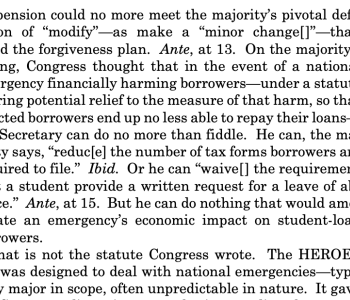Legal minds, what do empty brackets mean inside a quote? Like this: Can I "ask[ ] you?"
I came across this usage in excerpts from the dissent by Justice Kagan to the US Supreme Court's decision [see image I will attempt to attach, that I snagged from here: https://www.lawyersgunsmoneyblog.com/2023/06/john-roberts-demonstrates-a-justified-lack-of-confidence-in-his-arrogation-of-congressional-and-presidential-authority]. I'm going to guess that it indicates a tense change, so like in my example in the post title maybe the quote was "asked you" and I changed it to "ask[ ] you" to fit my sentence. I went to a lot of schooling but I don't recall this empty brackets usage. I figure, why not Ask Kbin!




Add comment